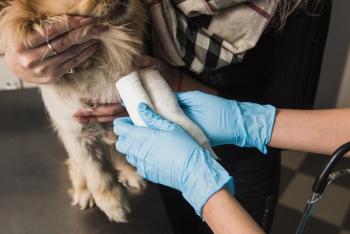
- dvm360 January 2019
- Volume 50
- Issue 1
Commentary: The importance of in-clinic veterinary blood donor programs
A recent public exposure of a canine blood supply company leaves Dr. Nicholas Dodman asking all those who love dogs to consider the best practices for blood donation.
Hemopet keeps this greyhound and approximately 200 others (many of them discarded by the racing industry) in barren enclosures and sells their blood to over 2,000 veterinary clinics in North America and Asia. Blood transfusion, a procedure that should bring nothing to mind but its lifesaving effects. But it has recently come to my attention that one of the most prominent commercial canine blood banks-Hemopet in Garden Grove, California, which
As I looked at photographs and video footage of the dogs' living conditions, I was concerned about the lack of adequate bedding for such lean, thin-skinned dogs. They showed signs of hair loss, calluses and pockets of accumulated fluid under the skin, which are likely the result of prolonged confinement and pressure on their joints. These issues, if not addressed, can lead to painful open sores and infections.
PETA's eyewitness noted that the dogs barked and howled incessantly. As we all know, constant exposure to noise, confinement to small spaces and a lack of stimulation cause high levels of stress, which may have contributed to the diarrhea that many reportedly suffered from and to the fighting that occurred among those who were caged together, resulting in bite wounds and other injuries.
Up to 10 percent of the dogs' blood was extracted every 10 to 14 days. In my opinion, removing so much blood so frequently is dangerous to their health and compromises the quality of the blood taken.
Hemopet bills itself as a “rescue” for retired racing greyhounds even though it takes and sells their blood for 18 months or longer before ever allowing them to be available for adoption. The blood-collecting aspect of this registered nonprofit earns it over $1 million a year but does nothing to benefit the dogs held captive there. To keep them in prison-like conditions with limited space-lying in crates or muzzled in kennels-for 23 hours a day is inhumane. From what I can see, they don't have any semblance of a natural life, just a barren existence with very limited opportunities to engage in natural canine behavior.
These dogs are helpless to save themselves, but veterinarians and canine guardians can help them. Veterinarians can encourage their clients to volunteer large, healthy dogs occasionally to have their blood drawn and stored for transfusions. Many veterinary clinics and teaching hospitals at veterinary schools have a pool of regular volunteers that donate blood periodically and then go right back home. Some facilities even have bloodmobiles, similar to those used in American Red Cross blood drives.
Often, clinics offer discounts on services, free exams or other incentives to guardians who volunteer their dogs a couple of times a year to give blood. A study published in the Journal of Applied Animal Welfare Science concluded that “nonprofit, community-based canine volunteer donor programs for animal blood banks can be successful while maintaining high safety standards and ethical treatment of volunteers.”1
Animals whose blood is collected for transfusions belong in loving homes, not cages. As more veterinarians develop ethical blood-collection practices and more clients ask for and support them, fewer animals will be incarcerated in cages and used as living blood bags.
Reference
- DeLuca LA, Glass SG, Johnson RE, et al. Description and evaluation of a canine volunteer blood donor program. J Appl Anim Welf Sci 2006;9:129-141.
Articles in this issue
almost 7 years ago
New pet ownership data can help practices growalmost 7 years ago
Opioids and the veterinary teamabout 7 years ago
Ticks may hold the key to treating tick-borne diseaseabout 7 years ago
Susan Cain addresses audience of introverts at Fetch dvm360about 7 years ago
And the 2018 Practice Manager of the Year isabout 7 years ago
New products from Purina and BI target stress in veterinary patientsabout 7 years ago
Read all about it! The top 10 veterinary news articles of 2018Newsletter
From exam room tips to practice management insights, get trusted veterinary news delivered straight to your inbox—subscribe to dvm360.




